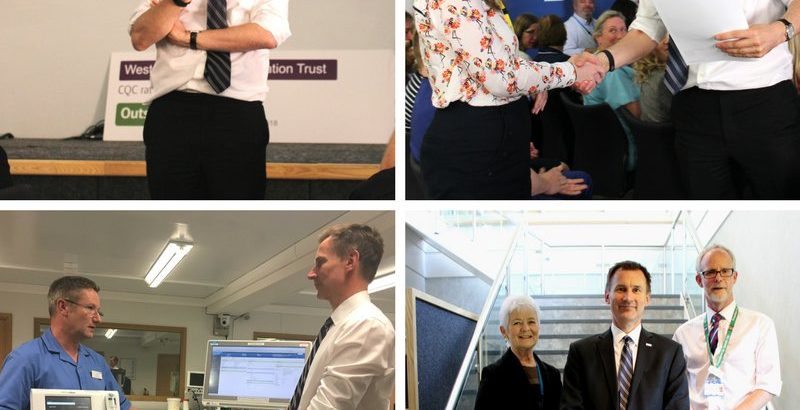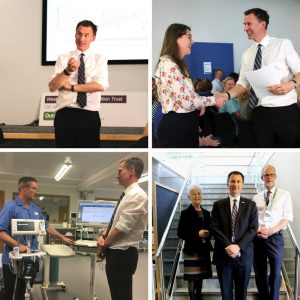The West Suffolk NHS Foundation Trust (WSFT) was delighted to host a visit from the Secretary of State for Health and Social Care last week (26 April), to discuss patient safety in the NHS.
During his visit to the West Suffolk Hospital, the Rt Hon Jeremy Hunt MP commended staff for their efforts in achieving the Trustâs latest âoutstandingâ rating from the Care Quality Commission, and highlighted the âfantastic workâ undertaken on their learning from deaths programme.
After hearing about tools from electronic dashboards to new equipment and apps that WSFT is using to improve patient safety, Mr Hunt spoke candidly to staff about his own experience and journey of patient safety in the NHS. Mr Hunt discussed the role of the Care Quality Commission, performance, patient satisfaction, and the importance of listening to and acting on patient experiences, before taking questions from staff in the room.
Mr Hunt said: âI want to thank staff at West Suffolk Hospital for welcoming me so warmly.
âI was hugely impressed by their commitment to improving patient safety – in particular the push to ensure technology to benefit patients is used right across the Trust, whether through innovative apps or electronic records.
âIt was fantastic to see the work theyâre doing on the learning from deaths programme – setting an example for the rest of the NHS to follow.
âStaff should be rightly proud of the outstanding rating from the CQC – and the rest of the NHS should take note of their commitment to improve beyond outstanding to âworld-leadingâ. Keep up the excellent work.â
The Secretary of State also praised leaders and staff alike for securing the top spot in the recent NHS Staff Survey 2017, where WSFT came top in the country against comparable trusts for staff recommending the Trust as a place to work or receive care.
He was then shown a demonstration of the Trustâs new vital signs monitors by nurse and nursing informatics lead Ian Coe; these machines measure a patientâs blood pressure, temperature, oxygen saturation and pulse and all other required parameters to enable immediate calculation of Early Warning Scores (EWS), which help to identify acutely unwell patients early. By scanning a barcode on the patientâs wrist, these readings are then placed directly into the patientâs electronic care record, reducing the risk of human error and saving time from data having to be inputted manually.
Chief executive Dr Stephen Dunn said: âIt was a pleasure to welcome the Secretary of State to our Trust in order to hear about patient safety from a national perspective.
âIn the NHS weâre all passionate about patient safety â itâs the bread and butter of what we do and why weâre here, and it was a fantastic opportunity to highlight the work weâre undertaking to continuously improve.â


